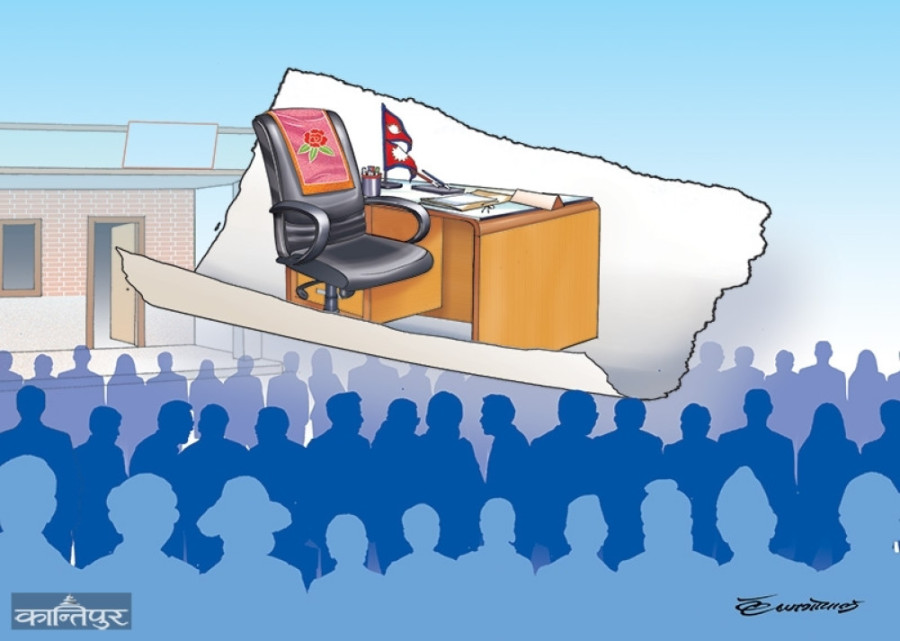Columns
Lawmaking at the local level
Unlike the local laws, delegated laws enforced by the centre reportedly promote corruption.
Khim Lal Devkota
The municipal executive branches function as the implementing organs of the local government, while the municipal councils in both rural and urban areas serve as their legislative bodies. In each local unit, the chief, deputy chief (mayor and deputy mayor in municipalities, chairperson and deputy chairperson in rural municipalities), ward chair and ward members are elected through the first-past-the-post system. These representatives nominate two additional members in rural and three in urban municipalities.
The local government (LG) assemblies formulate policies, rules, laws and standards, approving their annual budget and periodic plans. Local elections are held every five years. These assemblies enact necessary laws on issues mentioned in the constitution’s schedules in line with the provincial law. As per Article 226 of the constitution, the local governments are empowered to enact laws concerning matters within their jurisdiction, covering exclusive and concurrent rights outlined in Schedules 8 and 9 of the charter. Article 102 of the LG Operation Act, 2017 legally affirms the constitutional provision, authorising local governments to formulate primary laws on rights within their jurisdiction. The Act also empowers the executive to issue delegated laws (secondary laws), including regulations, guidelines, procedures and standards.
The local level should consider several crucial issues in terms of the principles to be adopted while making laws, as outlined by the Coordination and Inter-relation Law of 2020. These considerations include avoiding encroachment upon the exclusive powers of the federation and the province concerned, ensuring consistency with federal and provincial laws, adherence to national policies or priorities, and contributing to their effective implementation. Following the priorities of provincial governments is essential too. The local level is mandated to avoid duplication while implementing their programmes. Article 235 of the constitution requires the local governments to follow the coordination law.
While variations may occur in the lawmaking procedure across the provinces, Man Bahadur Aryal, joint secretary at the Ministry of Law and Justice, asserts that there are no disparities in fundamental matters. He said that the ministry had developed a model draft law to guide the lawmaking process at the local level and distributed it to the provinces. The legislation has been endorsed by the respective provincial assembly and handed down to the local level. There might be some minor differences, but the overall framework is uniform. The LG Operation Law also offers some guidelines on the matter.
The local executive is authorised to present a bill on matters within its jurisdiction before the assembly. If the bill garners majority support from the existing assembly members, the Assembly chair must sign the bill into law within fifteen days. Such acts come into force after their official publication in the local gazette. Additionally, the Assembly has the prerogative to establish various committees, such as the accounts committee, legislation committee and good governance committee, as necessitated by the regulations that oversee its operation.
A few months ago, the Legislative Management Committee of the National Assembly conducted an on-field study of various local units on lawmaking. The study concluded that all provinces have formulated and implemented laws related to the local level. The relevant branch of the office drafts the bill in coordination with the local legislative committee. After discussing the initial draft with stakeholders and experts, a final draft is prepared. The executive approves the draft, which is then submitted to the assembly. The assembly passes the draft, and the local government head certifies it.
The committee conducted a field study of six local units. Two years of the second term of the local governments has passed. Counting from the election of the first term in 2017, it’s seven years. A review of this period shows an average of 25 acts (primary laws) and 46 delegated laws have been formulated at each local level. Out of the total local laws, 65 percent are delegated laws. They include regulations, manuals, procedures and standards. An analysis by the Delegated Legislation Committee of the National Assembly suggests that 80 percent of the laws issued by the Government of Nepal are delegated laws. As revealed by this committee, these delegated laws are sources of corruption. Some constitutional commissions, namely the Office of the Auditor General and the Commission for Investigation of Abuse of Authority, have also drawn similar conclusions.
The study report identifies several issues in formulating local law. These include difficulties and ambivalence in legislating concurrent rights, challenges in service delivery and staff management due to the absence of the Federal Civil Service Law, arbitrary fees levied on river materials and their extraction, confusion surrounding the authority of city police and the recognised need for updating the LG Operation Act. A notable concern is the absence of regulations for this act, which leads to difficulties in overall legal formulation and implementation at the local level.
Additional problems, such as legal obstacles to the use and deployment of the Nepal Police, particularly in enforcing the decisions of the Judicial Committee, are identified. Issues also arise in the use of river products due to forest laws, creating challenges for exercising local rights within conservation areas. Provincial laws interfere with or encroach upon the powers of the local level, and problems in coordination persist between provincial and local levels. The inability to implement local-level rights on water supply poses a significant challenge, while there is also a shortage of skilled manpower in lawmaking. Matters related to education and language face complications due to the actions of the provincial and federal governments.
There is an urgent need for a system to measure the implementation of laws. To enhance the effectiveness of local governance, these issues, particularly those identified by the parliamentary committee, need to be addressed.




 8.26°C Kathmandu
8.26°C Kathmandu















